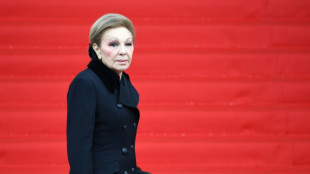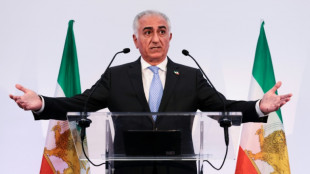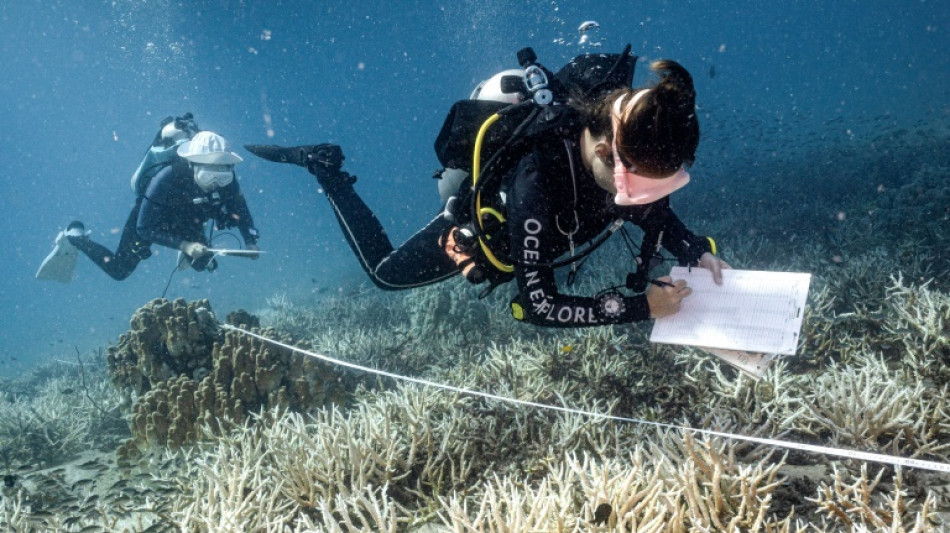
-
 Surging billionaire wealth a political threat, Oxfam warns as Davos opens
Surging billionaire wealth a political threat, Oxfam warns as Davos opens
-
Morocco fans stunned, disappointed as Senegal win Africa title

-
 Senegal fuelled by 'injustice' in AFCON final triumph, says hero Gueye
Senegal fuelled by 'injustice' in AFCON final triumph, says hero Gueye
-
Morocco coach Regragui laments 'shameful' scenes in AFCON final defeat

-
 Maye, Boutte wonder-catch carry Patriots past Texans
Maye, Boutte wonder-catch carry Patriots past Texans
-
Train collision in Spain kills 21, injures dozens

-
 Brazilians Abner, Endrick help Lyon climb to 4th in Ligue 1
Brazilians Abner, Endrick help Lyon climb to 4th in Ligue 1
-
Barca beaten at Real Sociedad as Liga title race tightens

-
 Socialist to face far-right candidate for Portugal's presidency
Socialist to face far-right candidate for Portugal's presidency
-
Senegal stun hosts Morocco to win AFCON title after final walk-off protest

-
 Syria's leader agrees truce with Kurds after govt troops advance
Syria's leader agrees truce with Kurds after govt troops advance
-
Morant shines as Grizzlies top Magic in London

-
 Real Sociedad end Barca winning streak to tighten Liga title race
Real Sociedad end Barca winning streak to tighten Liga title race
-
Senegal stun hosts Morocco to win AFCON title after ugly scenes mar final

-
 AC Milan in touch with Inter thanks to Fullkrug's first Serie A goal
AC Milan in touch with Inter thanks to Fullkrug's first Serie A goal
-
Lyon climb to fourth in Ligue 1 with victory over Brest

-
 Morant shines as Grizzles top Magic in London
Morant shines as Grizzles top Magic in London
-
Trump admin orders 1,500 troops to prepare for possible Minnesota deployment

-
 Limited internet briefly returns in Iran after protest blackout
Limited internet briefly returns in Iran after protest blackout
-
South Africa declares national disaster as floods batter region

-
 Gang members in Guatemala kill seven police after prison crackdown: minister
Gang members in Guatemala kill seven police after prison crackdown: minister
-
Villa's title bid rocked by Everton loss, Newcastle held at Wolves

-
 Dybala boosts Roma's Champions League hopes, Fiorentina honour Commisso
Dybala boosts Roma's Champions League hopes, Fiorentina honour Commisso
-
Villa's title bid rocked by Everton loss, Newcastle held by Wolves

-
 'Avatar: Fire and Ash' at number one in N.America for fifth straight week
'Avatar: Fire and Ash' at number one in N.America for fifth straight week
-
Limited internet returns in Iran after protest blackout

-
 Syria's leader agrees truce deal with Kurds after govt troops advance
Syria's leader agrees truce deal with Kurds after govt troops advance
-
Smith's penalty sees Quins eliminate La Rochelle, Bordeaux secure top seeding

-
 Atletico edge Alaves to strengthen Liga top-four hold
Atletico edge Alaves to strengthen Liga top-four hold
-
Uganda president says opposition 'terrorists' in victory speech

-
 New Zealand register first ODI series win in India despite Kohli ton
New Zealand register first ODI series win in India despite Kohli ton
-
Elvira wins Dubai Invitational after Lowry's last hole meltdown

-
 Jeong snatches Union late draw at Stuttgart in Bundesliga
Jeong snatches Union late draw at Stuttgart in Bundesliga
-
Man Utd's Martinez hits back at Scholes after height jibes

-
 Frank on the brink as Romero calls for unity amid Spurs 'disaster'
Frank on the brink as Romero calls for unity amid Spurs 'disaster'
-
Chile declares emergency as wildfires kill at least 15

-
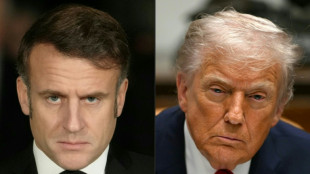 Europe hits back at Trump tariff threat over Greenland
Europe hits back at Trump tariff threat over Greenland
-
Men's Fashion Week in Paris: what to watch

-
 McGrath goes top of slalom standings with Wengen win
McGrath goes top of slalom standings with Wengen win
-
No Venus fairytale as Alcaraz, Sabalenka win Melbourne openers

-
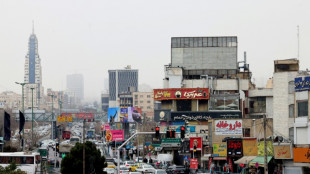 Iran considers 'gradually' restoring internet after shutdown
Iran considers 'gradually' restoring internet after shutdown
-
Mitchell, Phillips tons guide New Zealand to 337-8 in ODI decider

-
 Flailing Frankfurt sack coach Toppmoeller
Flailing Frankfurt sack coach Toppmoeller
-
Kurdish forces withdraw from Syria's largest oil field as govt forces advance

-
 'Proud' Venus Williams, 45, exits Australian Open after epic battle
'Proud' Venus Williams, 45, exits Australian Open after epic battle
-
Vonn in Olympic form with another World Cup podium in Tarvisio super-G

-
 Alcaraz kicks off career Grand Slam bid with tough Australian Open test
Alcaraz kicks off career Grand Slam bid with tough Australian Open test
-
Hosts Morocco face Mane's Senegal for AFCON glory

-
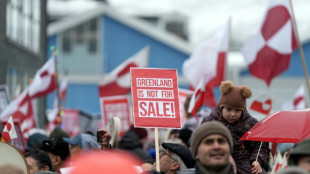 Europe scrambles to respond to Trump tariff threat
Europe scrambles to respond to Trump tariff threat
-
Venus Williams, 45, exits Australian Open after epic battle


Countries lock horns over cash for nature at rebooted UN talks
The world's biggest nature conservation conference will restart on Tuesday after negotiations collapsed in disarray last year, with the head of the meeting warning that increasing global "polarisation" was frustrating efforts to protect the planet.
More than two years after a landmark deal on nature -- including a pledge to protect 30 percent of the world's land and seas by 2030 -- nations continue to haggle over the money needed to reverse destruction that scientists say threatens a million species.
Negotiators meeting at the UN's Food and Agriculture Organization headquarters in Rome this week are tasked with breaking a deadlock on funding between rich and developing countries that saw COP16 talks in Cali, Colombia end without agreement in November.
The leader of the UN negotiations, Colombian Environment Minister Susana Muhamad, said countries need to "substantially address these existential crises of biodiversity loss and climate change".
But she said progress in Cali was hamstrung by international rifts.
"Why do we have such polarisation around that issue?" she told a press conference on Monday.
"It has to do, I think in my perspective, with the changing landscape of power in geopolitics, and it has also to do with the requirements that armed conflicts are putting on finance of countries."
Muhamad did not mention specifics, but policymakers in wealthy nations are facing challenges from trade tensions to the war in Ukraine.
The re-election of Donald Trump is also casting a shadow, despite the United States not having signed up to the UN's Convention on Biological Diversity.
- Funding fight -
Muhamad said she was "hopeful" that discussions since the Cali meeting have helped to lay the groundwork for a resolution in Rome.
Countries have until Thursday to hammer out a plan to reach a promised $200 billion a year in finance for nature by 2030, including $30 billion a year from wealthier countries to poorer ones.
The squabble in Cali was mainly over the way in which that funding is delivered.
Developing nations -- led by Brazil and the African group -- want the creation of a new, dedicated biodiversity fund, saying they are not adequately represented in existing mechanisms.
Wealthy nations -- led by the European Union, Japan and Canada -- say setting up multiple funds fragments aid.
On Friday, the COP16 presidency published a new text that seeks to navigate around the "red lines" of each bloc of countries, according to Aleksandar Rankovic of the Common Initiative think tank.
The document proposed kicking the ultimate decision on a new biodiversity fund to future UN talks, while suggesting reforming existing financing for nature conservation.
Observers will be watching closely to see if developed countries, including those in budgetary crises like France and Germany, can be persuaded to agree.
In 2022, nations identified 23 goals to be achieved within the decade, designed to protect the planet and its living creatures from deforestation, over-exploitation of resources, climate change, pollution and invasive species.
The true cost of such destruction of nature is often hidden or ignored, scientists warned last year in a landmark report for the UN's expert biodiversity panel.
They estimated that fossil fuels, farming and fisheries could inflict up to $25 trillion a year in accounted costs -- equivalent to a quarter of global GDP.
The failure to reach agreement in Cali was the first in a string of disappointing outcomes for the planet at UN summits last year.
A climate finance deal at COP29 in Azerbaijan in November was slammed as disappointing by developing nations, while in December negotiators failed to produce an agreement on how to respond to drought at Saudi-hosted UN desertification talks.
Divisions between countries also stalled negotiations in South Korea's Busan on the world's first treaty to tackle plastic pollution in December.
U.Maertens--VB


